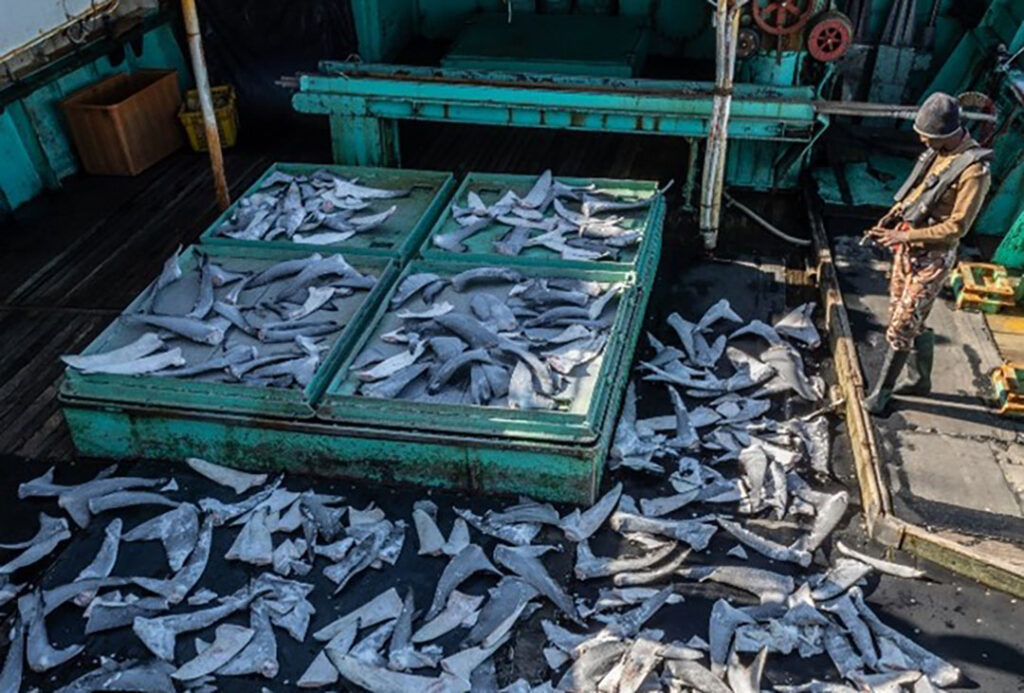ADF STAFF
Dozens of suspected human trafficking victims were rescued from two industrial fishing vessels in Namibia in early September.
Of the 60 people rescued from MV Shang Fu and the Nata 2 in Walvis Bay, most are from the Philippines, although several were from Angola, Indonesia, Namibia, Mozambique and Vietnam, according to The Namibian newspaper. The suspected victims worked a variety of jobs on the vessels.
“The assessment on the victims were done by social workers, and that is still ongoing, as well as inspection of the vessels by labor ministry officials, and it was detected that these people were maltreated, working long hours without rest,” National Police spokesperson and Deputy Commissioner Kauna Shikwambi told The Namibian. “They were even forced to work while sick.”
Local authorities were formulating trafficking cases against Nata Fishing Enterprises, which owns the vessels. Directors of the company face charges of human trafficking, violating Namibia’s Labor Act, Immigration Control Act, Marine Resources Act and possibly fraud, the newspaper reported.
Online records show that the MV Shang Fu and the Nata 2 are registered to fish in Namibia, but Chinese trawlers are notorious for “flagging in” to African nations, meaning they use and abuse local rules to flag a foreign-owned and -operated fishing vessel into an African registry to fish in local waters.
Flagging in is a common sign that vessels engage in illegal, unreported and unregulated (IUU) fishing.
There is little oversight of the online open registries. This means that a fishing company in China can register to fish in Namibia and pay the registration fee electronically. China, which has targeted West Africa since the 1980s, is the world’s worst IUU fishing offender, according to the IUU Fishing Index.
Illegal fishing costs West Africa $2.3 billion each year, according to the United Nations. IUU fishing is also linked to other sea crimes, such as piracy and drug and weapons smuggling.
Some rescued victims worked on the vessels for several years. Immanuel Festus, a regional coordinator for Namibia’s Mining, Metal, Maritime and Construction (MMMC) workers’ union, told The Namibian that they were likely recruited for cheap labor.
“What normally happens with some fishing companies is they look for people who are willing to accept any offer, especially exploitative ones,” Festus told the newspaper. “People take this, because it is something to put in their pockets.”
Shikwambi said there were no medical personnel on either vessel and they did not have sufficient blankets. None of the workers had work permits or visas.
Reports of labor abuses on fishing vessels are not rare.
Emmanuel Essien, a 28-year-old Ghanaian fisheries observer, was working on board the Chinese trawler Meng Xin 15 when he went missing in July 2019. Essien had captured video of the crew engaging in saiko, an illegal practice in which a catch is transferred from a trawler to a large canoe. He hasn’t been seen since he disappeared from his cabin aboard the vessel.
Ghanaian workers anonymously told the Environmental Justice Foundation that they commonly suffer from physical abuse, lack of drinkable water, occasional 24-hour workdays and a lack of medical treatment on board foreign trawlers.
Fishermen from Kenya and Indonesian workers in Somalia have publicly alleged that Chinese captains and crew members beat them, provided inadequate food and shelter, and forced them to work after their contracts expired with no additional pay.
Days after the alleged victims were rescued from the MV Shang Fu and the Nata 2, Festus, the Namibian union coordinator, urged the national government to tighten controls to curb illegal fishing and human trafficking.
Daniel Imbili, union president of Namibia Fishing Industries as well as the Fishermen and Allied Workers’ Union, agreed, telling The Namibian that unions and the government should work together to protect fishermen.
“The Namibian working class is very vulnerable to being deceived and coerced due to the weak implementation of the port state measures and the reluctance of the labor ministry to amend the Labor Act in line with the work in the fishing convention, which was adopted by the parliament a few years ago,” Imbili told the newspaper.
Despite the criticism, Namibia has taken steps in recent years to battle illegal fishing.
In 2019, Namibia allocated $2.7 million toward the fight against illegal fishing and partnered with Sea Shepherd Global to help protect the country’s waters. This year, the partnership, which operates with the Namibian Ministry of Fisheries and Marine Resources and the Namibian Police, has successfully carried out joint surveillance activities, according to Sea Shepherd.
In September, Sea Shepherd helped Namibian authorities arrest a trawler that carried an illegal amount of shark fins.

